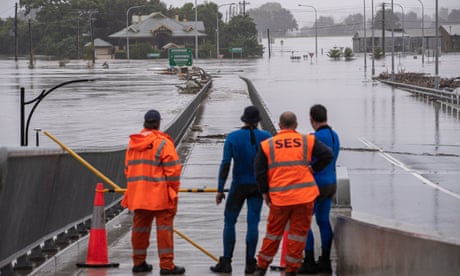- by foxnews
- 10 Mar 2025
SES units in flood-hit NSW raised alarm in 2020 that restructure threatened ‘future of the service’
SES units in flood-hit NSW raised alarm in 2020 that restructure threatened ‘future of the service’
- by theguardian
- 16 Mar 2022
- in news

State Emergency Service units in some of the hardest-hit flood areas in northern New South Wales had warned the closure of regional offices in 2020 would reduce their ability to respond to natural disasters.
Communication between the SES units and senior levels of the organisation reveals tension about a restructure which was blamed on NSW government budget cuts.
The complaint was spearheaded by the Kyogle SES unit and co-signed by unit commanders including in Ballina, Broadwater, Casino, Coraki, Lismore, Mullumbimby, Murwillumbah, and Richmond Tweed - some of the towns worst affected by the recent floods.
In response, the SES commissioner, Carlene York, conceded that "transformation did result in a reduction in staff" and had harmed "connection and support to units".
"However this was necessary to meet government savings targets," she said.
In the 2018 budget, the then NSW treasurer and now premier, Dominic Perrottet, increased the "efficiency dividend" for government departments from 2% to 3%.
Unions warned at the time the measure would cost jobs and hurt services, but the government justified it on the basis it would "reduce back-office costs and focus expenditure where it is needed most".
The response by the state SES and Australian Defence Force to what authorities describe as a one-in-500-year flood has been sluggish, prompting criticism that local communities were left to conduct their own rescues and clean-up.
Most SES units do not conduct rescues and SES members do not blame the quality of the flood response on the restructure, but say it has contributed to a long-term decline in capacity responding to natural disasters.
In the complaint, the SES units said the "removal of regional offices" had "pushed significant new administrative burdens on to volunteers, frustrating and demoralising dedicated members".
"Very experienced and skilful members have withdrawn from active participation in several units as a result of recent developments," it said.
New procedures for community engagement during Covid-19 had left the SES "increasingly invisible", making it more difficult to attract volunteers and donations.
"All volunteer services have suffered in recent decades but ours is becoming increasingly difficult.
"Our active members grow older and our capacity to work for our community diminishes."
The new training regime was too focused on "keyboard and screen-based courses", while "region-based training seems to have disappeared", replaced by courses "hundreds of kilometres away" in Sydney or Newcastle.
"The changes we have referred to here are undermining morale, cutting unit membership numbers and throwing up barriers to what we see as our essential roles as emergency service volunteers within and for our communities.
"These are not trivial problems. They are serious concerns."
The dire warnings proved true for the Tabulam SES unit, one signatory of the complaint, which currently has no members.
York responded that it was "regretful the cluster feels undervalued and disappointed", blaming the closure of regional offices on "government savings targets" but promising to "endeavour to seek additional resources".
York promised consultation to fix deficiencies in training and that community engagement could recommence.
"I want to assure you the staff at [SES headquarters] and throughout the zones are not remote bureaucrats, noting approximately 50% of staff are volunteers as well, having a very good understanding of the needs of units.
"From what I have seen they sincerely want to support the volunteers."
Bob Mills, a former SES member and Labor staffer, told Guardian Australia the restructure had caused issues with "training, administration and coordination with ambulance, police and fire [the rural fire service]".
"Coordination used to be handled by the regional head office, who had everyone's number and knew how to contact everyone," Mills said. "Now each unit is supposed to know how to do it - and they just don't."
"The state government is now throwing equipment at the SES but they're not being trained to use it. There's nobody to do the training and assessment."
Mills, who left the SES in January, said there had been meetings to address training issues, but they were still unresolved and "up in the air".
Mills thinks the increasing professionalisation of the SES points towards having a civil natural disaster authority, which Labor has said it will consider if elected.
"My personal view is they're going to have to go semi-professional, like the army reserve, with people who are on standby.
"They've been doing this on the cheap, on a volunteer basis, but they're now demanding very professional standards."
The minister for emergency services, resilience and flood recovery, Steph Cooke, declined to answer questions about why the government had imposed savings targets on the SES.
"Internal SES reporting lines and structures are a matter for the SES," she said. "The overall response to the 2022 floods will be subject to a review."
A NSW SES spokesperson said it "values the local knowledge and experience of our volunteer membership" and acknowledged that "recent weather events have increased the demand on NSW SES resources".
The spokesperson said the organisation "strives for continuous improvement".
"The NSW SES relies on community members volunteering their services, and we always seek additional volunteers into any unit across the state."
- by foxnews
- descember 09, 2016
Ancient structure used for cult 'rituals' discovered by archaeologists
A Neolithic Timber Circle was discovered by archeologists in Denmark resembling the historical landmark Stonehenge in the U.K. It is open to be viewed by the public.
read more


